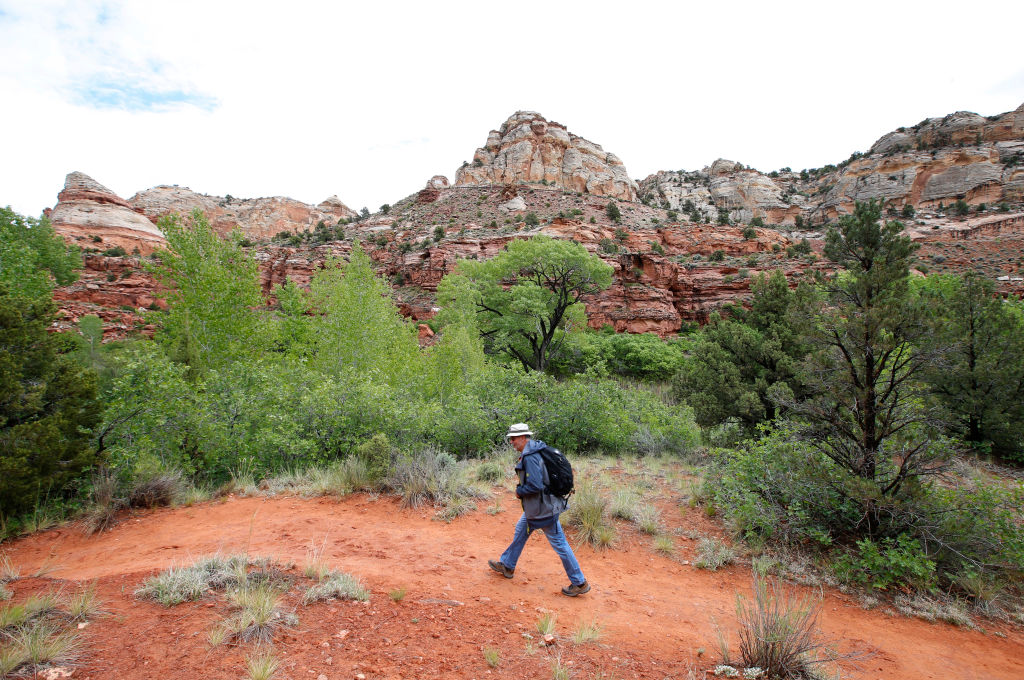Scientists say shrinking national monument in Utah would hinder dinosaur discoveries


A free daily email with the biggest news stories of the day – and the best features from TheWeek.com
You are now subscribed
Your newsletter sign-up was successful
In the 21 years since President Bill Clinton designated 1.9 million acres in southern Utah as the Grand Staircase-Escalante National Monument, dozens of extinct forms of lizards, frogs, birds, crocodiles, and even several dinosaurs have been discovered by paleontologists, who are afraid that under President Trump, the only thing people will be digging for in the area is coal.
Grand Staircase-Escalante, specifically the Kaiparowits Plateau, is rich with fossils, and because of the national monument's size, most of it is still untouched by paleontologists. Trump has ordered Interior Secretary Ryan Zinke to take a closer look at the major national monuments created in the last two decades, and he's proposed making Grand Staircase-Escalante smaller, and allowing coal mining, oil drilling, and mineral extraction on the land. When Clinton created the monument, Utah Republicans weren't happy, in part because it ended a proposed coal mine; there is an estimated 62 billion tons of coal where the fossil beds are.
"The research in the monument, from my perspective, has only just begun," paleontologist Jeff Eaton told the Los Angeles Times. "The shrinking of it for what I would say are fairly petty, shallow, and short-term interests will clearly interfere with, and even potentially destroy, aspects of future research." Most of the fossils that are discovered in Grand Staircase-Escalante are sent to Salt Lake City's National History Museum of Utah, and perhaps that's one way to get the president interested in keeping the national monument the way it is — tell him the next dinosaur discovered will be named the Trumposaurus, and it'll be on display in front of fawning crowds in perpetuity.
The Week
Escape your echo chamber. Get the facts behind the news, plus analysis from multiple perspectives.

Sign up for The Week's Free Newsletters
From our morning news briefing to a weekly Good News Newsletter, get the best of The Week delivered directly to your inbox.
From our morning news briefing to a weekly Good News Newsletter, get the best of The Week delivered directly to your inbox.
A free daily email with the biggest news stories of the day – and the best features from TheWeek.com
Catherine Garcia has worked as a senior writer at The Week since 2014. Her writing and reporting have appeared in Entertainment Weekly, The New York Times, Wirecutter, NBC News and "The Book of Jezebel," among others. She's a graduate of the University of Redlands and the Columbia University Graduate School of Journalism.
-
 5 calamitous cartoons about the Washington Post layoffs
5 calamitous cartoons about the Washington Post layoffsCartoons Artists take on a new chapter in journalism, democracy in darkness, and more
-
 Political cartoons for February 14
Political cartoons for February 14Cartoons Saturday's political cartoons include a Valentine's grift, Hillary on the hook, and more
-
 Tourangelle-style pork with prunes recipe
Tourangelle-style pork with prunes recipeThe Week Recommends This traditional, rustic dish is a French classic
-
 Blue Origin launches Mars probes in NASA debut
Blue Origin launches Mars probes in NASA debutSpeed Read The New Glenn rocket is carrying small twin spacecraft toward Mars as part of NASA’s Escapade mission
-
 Dinosaurs were thriving before asteroid, study finds
Dinosaurs were thriving before asteroid, study findsSpeed Read The dinosaurs would not have gone extinct if not for the asteroid
-
 SpaceX breaks Starship losing streak in 10th test
SpaceX breaks Starship losing streak in 10th testspeed read The Starship rocket's test flight was largely successful, deploying eight dummy satellites during its hour in space
-
 Rabbits with 'horns' sighted across Colorado
Rabbits with 'horns' sighted across Coloradospeed read These creatures are infected with the 'mostly harmless' Shope papilloma virus
-
 Lithium shows promise in Alzheimer's study
Lithium shows promise in Alzheimer's studySpeed Read Potential new treatments could use small amounts of the common metal
-
 Scientists discover cause of massive sea star die-off
Scientists discover cause of massive sea star die-offSpeed Read A bacteria related to cholera has been found responsible for the deaths of more than 5 billion sea stars
-
 'Thriving' ecosystem found 30,000 feet undersea
'Thriving' ecosystem found 30,000 feet underseaSpeed Read Researchers discovered communities of creatures living in frigid, pitch-black waters under high pressure
-
 New York plans first nuclear plant in 36 years
New York plans first nuclear plant in 36 yearsSpeed Read The plant, to be constructed somewhere in upstate New York, will produce enough energy to power a million homes
